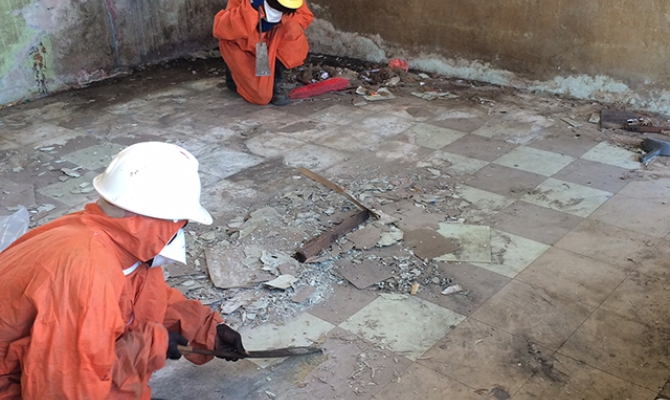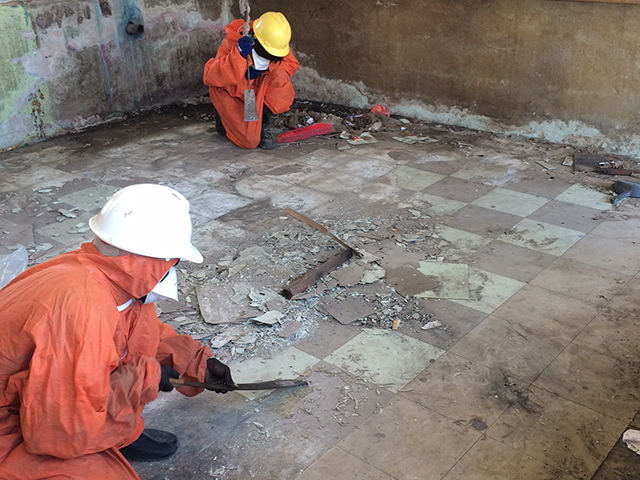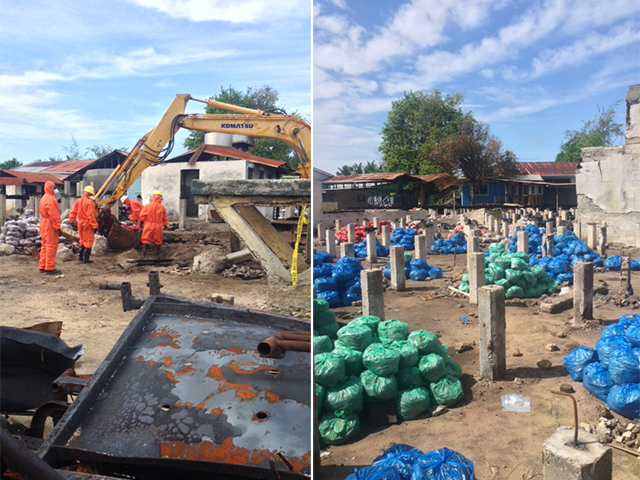
Waste Management and Pollution Control
After fire ripped through the Old Gizo Hospital Building in Solomon Islands, clean-up efforts were immediately complicated by the discovery of asbestos materials in the debris.
Some of these potentially harmful materials may have originated from newly installed asbestos cladding which continues to be imported and sold in Solomon Islands and elsewhere in the Pacific.
Representatives from the Solomon Islands Government, Secretariat of the Pacific Regional Environment Programme (SPREP), European Union, and the World Health Organization (WHO) believe that this incident highlights the urgent need for a Pacific-wide asbestos ban.
Head of Cooperation at the European Union Delegation for the Pacific, Mr Christoph Wagner said that the European Union would welcome any move from Pacific Island nations to join 57 other countries, including all member states of the European Union, to ban asbestos:
"Preventing the future import and sale of asbestos products would help to protect the health and wellbeing of communities across the Pacific region."

When local inspectors identified suspected asbestos materials at the site in the aftermath of the July 22 fire, the Government of Solomon Islands accepted an offer of assistance from the Pacific Hazardous Waste Management Project (PacWaste) to deploy a team of qualified asbestos experts to the site.
Dr Melchior Mataki, Permanent Secretary for the Solomon Islands Ministry of Environment, Climate Change, Disaster Management and Meteorology, explains the first priority was to ensure the safety of clean-up personnel and the general public:
"We know for a fact that new building materials containing asbestos are being sold at retail outlets in Solomon Islands. Often these materials are not even labelled as containing asbestos, so people purchase and use them without knowing the potential health risk that they pose."
The PacWaste asbestos experts undertook air monitoring, sampling and worked with local contractors to safely remove asbestos-contaminated debris and thoroughly clean the site. Other national stakeholders involved in the coordination of the response included the Western Province Provincial Government and Disaster Committee, the Ministry of Health and Medical Services and the Ministry of Infrastructure Development.

Mr John O'Grady from Contract Environmental led the PacWaste asbestos clean-up work in Gizo. Mr O'Grady believes that the incident highlights the need for controls on the import and re-use of asbestos products in the region:
"Pacific countries urgently need a ban on asbestos products. The current situation is that asbestos materials can be lawfully imported and used in Pacific island countries and territories. Under such circumstances, the region can expect to see a proliferation of asbestos containing materials and, potentially, of asbestos related illnesses."
Dr Rokho Kim of the World Health Organization (WHO) explains that asbestos related diseases are responsible for more than 100,000 deaths each year:
"WHO recognises that the most efficient way to eliminate asbestos-related diseases is to stop the use of all types of asbestos – this is because there is no safe threshold of exposure. If regulations are not implemented to prevent the import of asbestos in the Pacific then it will continue to be used in both residential and non-residential locations across the region."
Asbestos is one of the four focus areas of the European Union funded PacWaste project – a 7.85 million euro project funded by the European Union and implemented by SPREP.
PacWaste Project Manager, Mr Stewart Williams, explains that the project is arranging for removal, transport and safe disposal of almost 40,000 square metres of asbestos across 11 different Pacific island countries.
"PacWaste is working to reduce old stockpiles of asbestos across the Pacific and make sure it is disposed of safely. Unfortunately, we now know that asbestos in the Pacific is no longer a legacy issue. If regulations aren't implemented to prevent this flood of new asbestos from coming into the region then we can reasonably expect the problem to compound."
The topic of a Pacific-wide ban on the import of asbestos products will be discussed at the upcoming Twenty-seventh SPREP Meeting of Officials to be held in Niue from 19-22 September, 2016.
Some of these potentially harmful materials may have originated from newly installed asbestos cladding which continues to be imported and sold in Solomon Islands and elsewhere in the Pacific.
Representatives from the Solomon Islands Government, Secretariat of the Pacific Regional Environment Programme (SPREP), European Union, and the World Health Organization (WHO) believe that this incident highlights the urgent need for a Pacific-wide asbestos ban.
Head of Cooperation at the European Union Delegation for the Pacific, Mr Christoph Wagner said that the European Union would welcome any move from Pacific Island nations to join 57 other countries, including all member states of the European Union, to ban asbestos:
"Preventing the future import and sale of asbestos products would help to protect the health and wellbeing of communities across the Pacific region."

Damaged asbestos flooring materials are safely removed at a building adjacent to the site of the fire. Photo: Brad Wallace.
When local inspectors identified suspected asbestos materials at the site in the aftermath of the July 22 fire, the Government of Solomon Islands accepted an offer of assistance from the Pacific Hazardous Waste Management Project (PacWaste) to deploy a team of qualified asbestos experts to the site.
Dr Melchior Mataki, Permanent Secretary for the Solomon Islands Ministry of Environment, Climate Change, Disaster Management and Meteorology, explains the first priority was to ensure the safety of clean-up personnel and the general public:
"We know for a fact that new building materials containing asbestos are being sold at retail outlets in Solomon Islands. Often these materials are not even labelled as containing asbestos, so people purchase and use them without knowing the potential health risk that they pose."
The PacWaste asbestos experts undertook air monitoring, sampling and worked with local contractors to safely remove asbestos-contaminated debris and thoroughly clean the site. Other national stakeholders involved in the coordination of the response included the Western Province Provincial Government and Disaster Committee, the Ministry of Health and Medical Services and the Ministry of Infrastructure Development.

Asbestos removal works in progress at the site of the old Gizo Hospital. Photos: Don Hemmer.
Mr John O'Grady from Contract Environmental led the PacWaste asbestos clean-up work in Gizo. Mr O'Grady believes that the incident highlights the need for controls on the import and re-use of asbestos products in the region:
"Pacific countries urgently need a ban on asbestos products. The current situation is that asbestos materials can be lawfully imported and used in Pacific island countries and territories. Under such circumstances, the region can expect to see a proliferation of asbestos containing materials and, potentially, of asbestos related illnesses."
Dr Rokho Kim of the World Health Organization (WHO) explains that asbestos related diseases are responsible for more than 100,000 deaths each year:
"WHO recognises that the most efficient way to eliminate asbestos-related diseases is to stop the use of all types of asbestos – this is because there is no safe threshold of exposure. If regulations are not implemented to prevent the import of asbestos in the Pacific then it will continue to be used in both residential and non-residential locations across the region."
Asbestos is one of the four focus areas of the European Union funded PacWaste project – a 7.85 million euro project funded by the European Union and implemented by SPREP.
PacWaste Project Manager, Mr Stewart Williams, explains that the project is arranging for removal, transport and safe disposal of almost 40,000 square metres of asbestos across 11 different Pacific island countries.
"PacWaste is working to reduce old stockpiles of asbestos across the Pacific and make sure it is disposed of safely. Unfortunately, we now know that asbestos in the Pacific is no longer a legacy issue. If regulations aren't implemented to prevent this flood of new asbestos from coming into the region then we can reasonably expect the problem to compound."
The topic of a Pacific-wide ban on the import of asbestos products will be discussed at the upcoming Twenty-seventh SPREP Meeting of Officials to be held in Niue from 19-22 September, 2016.